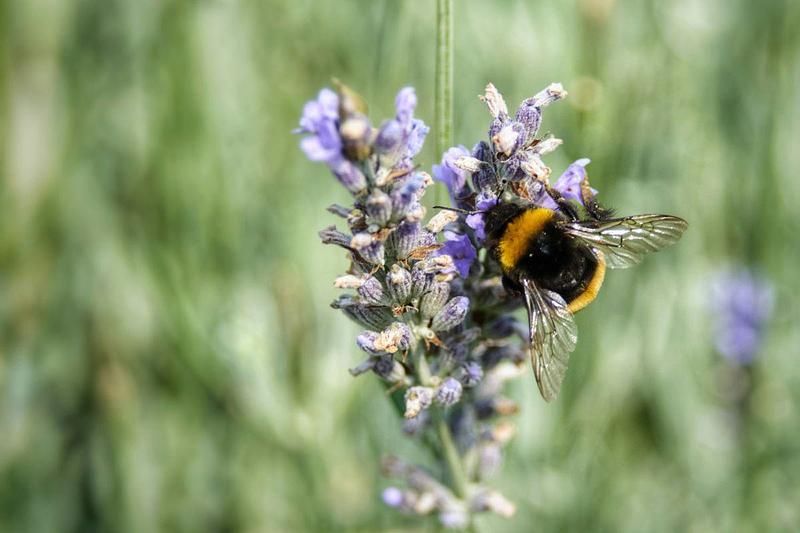Looking for more in Book Week Scotland?
The Bees by Rachelle Atalla
We commissioned Rachelle Atalla to write us an exclusive story on the theme of Hope for Book Week Scotland

Before they arrive, we attend a weekend beekeeping course for beginners. We are inundated with facts – brood boxes, hive frames, inspections, queen cells, foulbrood, infestations, swarming – the error for ‘keeper’ margin feels great and I am overwhelmed.
They arrive in Spring, a colony with an estimated population of ten thousand, including the queen, sourced from North Wales and couriered by Royal Mail, the only supplier willing to handle live insects. We’ve already picked a location in the garden and are instructed to keep them in their transport box for twenty-four hours before attempting to move them to their hive. There is the anticipation, awaiting the arrival of a house guest – the hope that they will feel comfortable, that we will meet their needs and expectations.
They are small bees, appearing docile and delicate, except for the queen who is three times the size of the others, a permanent red marker pen dot on her thorax. We call her Josephine.
The workers come and go in almost constant motion, a highway of movement in the sky as I stand in their flight path. It’s mesmerising. Their sense of home and direction is already better than my own, and they return with their little bee-leg saddle bags bulbous with pollen.
They don’t gather nectar at night, their vision poor in the dark. But I worry some will be delayed, having travelled too far, missing their window of return. I worry more that I have no way of knowing, that there is no possible means of counting my colony.
I think about our bees working as a team, precise as they regurgitate nectar and pass it from mouth to mouth, fanning their wings, all in pursuit of dehydrating the nectar before forcing it into wax chambers to be sealed. I revel in knowing that I’ve helped assemble these frames, needing to feel involved in the process. Soon, these very frames will be weighted down with honey, my daughter’s name etched on the side of one.
We do a weekly inspection, as advised. We cannot allow another queen cell to grow and rival Josephine. We cannot risk a swarm. The bee suit is warm and secure, thick cotton, but the gloves are large and clumsy, and I fear that I, in turn, will be clumsy with the bees. Our mission is to find Josephine and ensure her safety. Where else in the world does one woman yield so much power and authority? I want to commune with her; feed off her success.
A guest comes to stay. He is telling me something important when I see a bee land in my daughter’s paddling pool. I compel our guest to stop speaking before grabbing a plastic cup, running to rescue my drowning bee, placing her gently on the ground. Eventually she takes flight and I imagine her regaling her peers with this story. I like the idea of being a hero.
I get stung for the first time, my own fault, crouching on the grass to try and see into the entrance, squashing an unsuspecting bee in the process. The sting is itchy, the skin raised, and I’m mournful for the bee, the suicidal action, the moment of panic.
The wax frames are beginning to fill, and I’m astounded, despite this being the very outcome we’ve been anticipating. I grow obsessed with checking the weather, fearful that the prolonged rain will force them to stay inside, that they’ll grow hungry. I contemplate introducing something artificial, sugar fondant for sustenance.
By the entrance to the hive, there is always a small heap of bee corpses, and I must remind myself that this is simply the way of things, that the hive only has space for the living. Despite this, their population soars, as does our confidence. We add more boxes, the hive growing taller – a tower of bees.
The first frames of honey are removed. We have no real means of extraction so devise a contraption, slicing off the wax seal, and stringing the frame up from an overhead kitchen cupboard, allowing the honey to drip, a sieve and bowl strategically placed underneath. It is light yellow, almost minty in its aftertaste, and I wonder where our bees have been – what are they seeing that I am not?
The second batch is richer in colour, more golden, tasting sweeter. I find it impossible not to continually dip a teaspoon in and sample the produce. There is a proudness in my posture as though I have created the substance myself, one of my greatest achievements. Yet simultaneously, I feel guilty for taking their honey, wonder if they consider it theft. I find reasons to justify my actions – my daughter’s eczema has never been better.
Autumn arrives and I must accept that soon the bees will begin their overwintering, remaining in their hive until Spring. We leave them most of the honey and fit a mouse guard as a precautionary measure because mice do not have our restraint. Already, the workers are evicting the male drones from the hive, surplus to requirements and a drain on resources.
We buy an insulating jacket, check for mites. Things look good; we are bee-keeping. I will the bees to cluster well, to generate the warmth required for survival. I imagine the queen at the centre enjoying a temperature that could be described as tropical, the work ethic of her workers never faulting.
I stand in the cold, touching distance of the hive. They are quiet but when I tap the roof, dare to disturb, there is a buzz of activity. I remain hopeful. Come Spring, perhaps we will have earned the right to create a second hive. We will give a new queen the opportunity to emerge. We will dot her with a new colour for a new year, and it will all start again.
